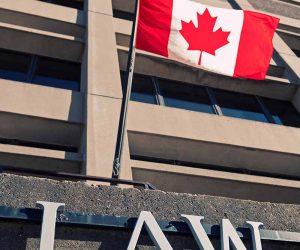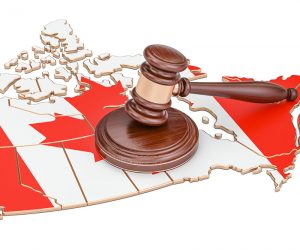 We need to know about the giant of a justice that is Justice France Charbonneau. Going after the baddest of the bad when nobody else would do so. At a time when security cameras and mobile phones with quality video were practically non-existent, unlike today. It was a period when retribution against Crown prosecutors by organized criminals was a real possibility and when people could carry out violent crimes without worrying about the certainty of getting recorded on video. That resolve, that conviction, that integrity, those are what distinguished Justice Charbonneau, and that is why she was appointed as a judge on Quebec’s Superior Court in 2004 and tapped to lead Quebec’s public inquiry into organized criminal activity in the awarding process for public contracts in 2011.
We need to know about the giant of a justice that is Justice France Charbonneau. Going after the baddest of the bad when nobody else would do so. At a time when security cameras and mobile phones with quality video were practically non-existent, unlike today. It was a period when retribution against Crown prosecutors by organized criminals was a real possibility and when people could carry out violent crimes without worrying about the certainty of getting recorded on video. That resolve, that conviction, that integrity, those are what distinguished Justice Charbonneau, and that is why she was appointed as a judge on Quebec’s Superior Court in 2004 and tapped to lead Quebec’s public inquiry into organized criminal activity in the awarding process for public contracts in 2011.
Yet, when Justice Charbonneau stated that organized criminal activity was far broader and more deeply rooted than everyone thought, that there was a connection between political party financing and the granting of subsidies and public contracts, and that this was a problem that was both deeply rooted and systemic, the co-Commissioner objected to Justice Charbonneau’s position. Everyone knew who this co-Commissioner was, but why was he objecting to Justice Charbonneau’s position? There may be many reasons as to why, but the main reason for doing so might have to do with how public inquiries can only be created by top bureaucrats and how they shield individuals, often bureaucrats, from criminal and civil responsibility.
The more you learn about public inquiries, the less things become clear.
In parts one and two of Bringing U.S. RICO Laws to Canada, the common theme was that addressing organized criminal activity across Canada has required public inquiries. In British Columbia it involved looking at the issue of money laundering in casinos, and in Quebec in involved looking at corruption related to the public procurement process. At the end of both inquiries, although much was brought to light, there was much confusion about what the essence of public inquiries was all about. Perhaps that is why only some people could answer what a public inquiry is or is not, because the legal language around public inquiries is just as unclear as the precedents that have been referenced to steer them, with some of those precedents going as far back as the 1970s.
As a starting point, public inquiries can be created under and governed by both provincial and federal legislation, and the legal language around outlining public inquiries is similar at both levels. In layman’s terms, if something is related to good government and public interest then a public inquiry can be called for those reasons, but usually under exceptional circumstances. A key stipulation for public inquiries has been that the findings of a public inquiry cannot be allowed to be transformed into a criminal investigation of specific offences identified as possibly having been committed by specific persons. Or in other words, if criminal activity is uncovered, those findings can not be used to carry on a criminal investigation concurrently, and individuals participating in a public inquiry are practically absolved from criminal and civil liability.
There are quite a few jargon-filled legal excuses related to jurisdiction and procedural rights, as to why this is the case with public inquiries, but the most often cited case dates back to 1997 with Attorney General v Commission of Inquiry on the Blood System. The summary of findings for that case, which had to do with an HIV-tainted blood scandal that occurred in the late 70s and throughout the 80s, included multiple legal opinions on the purpose of public inquiries and how to do them “right”.
Some of the most puzzling aspects of those opinions include how a judge opined that a Commissioner should “endeavor to avoid” using language associated with criminal or civil liability, meaning they should use language that softens the actions and resulting outcomes, especially if there may have been criminal and civil liability. That a Commissioner can make a finding that there has been a failure to comply with a certain standard of conduct, so long as it is clear that the standard is not legally binding. The judge suggested they should highlight failings but make sure to emphasize that the failings are just failings and can not be criminal or civil failings. There was even a quote where a judge opined about being certain that the Commissioner in the 1997 public inquiry would understand that it would set a dangerous precedent if they continued using verbiage that resembled an expression of the conclusion of law. Basically saying you are going to stop using that kind of language indefinitely effective immediately.
Perhaps just as puzzling is a judge’s opinion that reads, “public inquiries into tragedies inevitably tarnish reputations and raise questions about the responsibility borne by certain individuals. Consequently, Parliament and the courts have imposed strict limits on the use of these findings in civil and criminal trials. The findings made by a Commissioner, moreover, are merely statements of the Commissioner’s opinion with respect to the conduct of a person. Such an opinion does not have the weight, force, or effect of a judgment.” What is wrong about this passage is that it almost makes it seem like there may be some sort of “immunity” involved for partaking in the public inquiry. More so, what is shocking about it is that the second half of the passage disregards that Commissioners are always accomplished judges who have demonstrated the highest levels of integrity over their career, and it undermines their ability to use sound judgement and it discredits their findings as nothing more than opinions held by one person. It might make sense to avoid giving credence to inexperienced individuals opining on the matter but selecting accomplished judges to lead public inquiries only to undermine and relegate their findings as nothing more than opinions held by one person and ignoring that they are in fact a judge when it may be inconvenient is bad thinking.
One of the more interesting opinions states how if a Commissioner says that they will not be making any finding of criminal or civil responsibility then they are bound by those statements. However, the following sentence mentions how it is not necessary to deal with the ultimate scope of the findings that a Commissioner might make in a report. This would seem to suggest that it is not necessary for Commissioners to set out the scope of their public inquiry in advance, but that they are bound by anything they do set out. The same judge also opined on whether a Commissioner could ever make a finding of criminal or civil liability by saying that the matter was to be left open and to remain undetermined, but that the Commissioner in the 1997 case would not be allowed to do so because of what they stated previously about it not being criminal or civil in scope.
Other inadequacies around public inquiries involve a precedent set in 1979 regarding a policing scandal that shook the foundation of Canada’s Confederation, a case that involved the Attorney General of Quebec, the Attorney General and Solicitor General of Canada, the Commissioner of the Royal Canadian Mounted Police, and the Attorneys General of Ontario, New Brunswick, Manitoba, British Columbia, Saskatchewan, and Alberta. The mind-numbing precedent that was set in that case was that Commissions were prevented from commenting on internal administration and management of federal agencies.
Whatever the thinking may have been in 1979, there is no ignoring the interconnected nature of provincial and federal governments and the dynamic nature of threats in our modern age. This should be enough reason for us to revisit this precedent and consider if it is relevant for today’s standard. Moreover, given how our democracy works, how governments and Ministers can change every few years all but guarantees that some knowledge will be lost. So, there are bound to be instances where the hard truths about how a provincial or federal government is doing things needs to be addressed, and referring to a precedent set almost fifty years ago might not be the best approach to doing public inquiries.
Where things get even more confusing stems from the handicapping of Commissioners and requiring them to divorce themselves from the oath they took prior to being sworn in as a judge by asking them to self-impose limitations and limit themselves as to which lenses they can apply when assessing different situations. Because a Commissioner’s ability to apply the necessary lenses is limited, it should not be necessary to repeat that there was no basis and no evidence of certain actions, especially if they fall outside of their mandate. Instead, it would seem to be impossible to identify specific instances of the different types of wrongdoing without the appropriate lenses being permitted. Perhaps the question that needs answering is whether it is possible for mandates to be written in a manner that makes it possible for the mandate and scope to evolve and expand as necessary and after the Commission begins to get a better understanding of the issue at hand. Because under a narrow mandate, a Commission could not respond to the realization of any limitations as a result of the mandate, if there were other important areas necessary to review but from which they were prohibited from addressing.
This should lead us to consider the quality of thinking involved with relegating accomplished judges who have demonstrated integrity throughout their career and who have been appointed to lead a public inquiry and their subsequent findings as being nothing more than the opinions of a regular person. There seems to be no purpose to supressing Commissions from applying different lenses including those that might be for matters outside their mandate, but which Commissioners determine are just as important. These judges are typically of the highest integrity, and there is something fundamentally wrong with having framework requiring Commissioners to “turn on” and “turn off” things like assessing conduct and potentially overlooking criminality, especially if the integrity of our institutions is at stake. All of it feels like an ethical angle that has yet to be thought about by Canada’s top legal thinkers.
A summary of findings on the approach to public inquiry commission.
Any analysis of how we do public inquiries or other matters related to good government, and the hard questions that are associated with doing so, should not be seen as unimportant, uncomfortable, or divisive. Instead, the thinking behind these types of questions reaffirms the foundational pillars that uphold our trust in our courts, beginning with the ideas that everyone is equal under the law, that nobody is above or beneath the law, and that hard truths are necessary for easier reconciliations. If anything, time has shown that our people, our society, and our democracy are all capable of dealing with hard truths and that we are eager for easier reconciliations, and these are some of the ingredients that make up our shared values system.
Perhaps the most confusing part about law and jurisprudence is not the complicated legal jargon and the grey area technicalities, but rather being able to understand that what might constitute as being legal or illegal behavior is an entirely different standard from what would be considered right or wrong behavior. Perhaps the importance of being able to make that distinction might be best illustrated by highlighting the necessary standard of thinking required to distinguish between acting in good faith and acting in bad faith: understanding intentions and the duality that exists between good intentions and bad intentions. Good intentions can result in bad outcomes and vice versa, but bad intentions that result in bad outcomes should be looked at significantly differently from good intentions that result in bad outcomes. These nuances are necessary when it comes to establishing a set of societal norms and rules that can be agreed upon, and to be able to view situations on a case-by-case basis.
Is it unfair that a lawyer might be able to circumvent the law because their professional associations do not report certain criminal actions to the police? Yes. Is it unfair that a police officer might be able to break the law because a police services act provides them with a broad range of immunity? Yes. Now, would it be fair to then see a bureaucrat, who attempts to make the best possible decision where there is no good decision, end up in trouble with the law considering that they acted in good faith while the lawyer and police officer who acted in bad faith avoided legal repercussions? No. So, thinking of public inquiries as tools to go after principled individuals who were acting in good faith is bad thinking. However, public inquiries must be able to apply any lens necessary when it comes to ensuring the integrity of institutions, and the realization of anything that might give the appearance of criminality must not be withheld from policing agencies to investigate. Anything otherwise would be an indictment against the integrity of our institutions and an indictment against our democracy.


